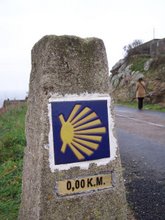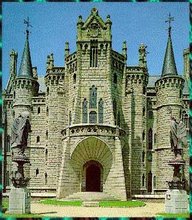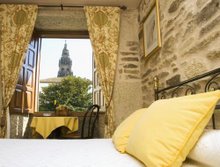Brendan, 22ish, from Philadelphia, biking the Camino. He´s going to be a senior at Richmond University (the Spaniards at the albergue kept calling it Rich Man University), a private school that is funding his trip. He´s billed it as some sort of independent study, is interviewing pilgrims along the way, and will write a paper comparing medieval and modern pilgrims.
He looks like a young Steve Correl (is that the name of the guy in The 40-Year-Old Virgin and the U.S. version of The Office?) and did the most elaborate set of stretches I´ve seen yet before heading off on his bike in the morning.
He´s one of the few Americans I´ve met on the Camino and the only one I´ve spoken to at any length. We both speak good Spanish so when hanging out with others at the albergue in San Xulian we went with the current of Spanish. But on the margins--taking in our laundrey when the rain started; ordering a drink from the bar--we took small, almost guilty sips of purely American English--letting our words run together, loading our sentences with slang.
I´ve spoken English a fair amount on the camino, but almost always to people for whom it is a 2nd or 3rd language. So I enunciate clearly, speak slowly, and choose my words carefully. It felt so comfortable to run off at the mouth in my native tongue, knowing that no matter how fast I talked, I´d be understood.
Brendan had a xeroxed list of questions he was asking any pilgrim who´d sit still: name, country of origin, religious or spiritual orientation, whether or not they were planning to ask anything of St. James. In the sociable mellee before our communal dinner, he interviwed four or five Spaniards, one of whom (Josu from Bilbao) told me about the many caminos in Spain (more on that in another post). Also learned that you can ask Santiago for 3 things (like a genie), not the one wish I thought I´d be confined to. The world opens up...
Later, after dinner, I asked the interviewer one of his own questions: was he going to ask anything of Santiago?
"I´m Protestant," he said. "We don´t pray to saints. We don´t roll that way. We think saints are really cool people who died."
Heidi, 50ish, German, lived in Chicago for 5 years and also in China and Singapore. This is her second partial camino; she began this time in Sahagun. She´s walking with a friend of her son, a quiet young man who speaks only German.
Sipping wine before dinner, we both got a little tipsy, and she confessed to me that it wasn´t easy walking with this young man. His lack of experience and language skills made it like ¨traveling with a disabled person." She said the next time she does the camino she will surely do it alone. "Because you´re never really alone on the trail anyway."
Heidi and her disabled freind had been logging at least 30 km each day. She said she felt great, except at nights when her legs felt like they were on fire and she couldn´t sleep.
In Ligonde
A guy running a pilgrim way station in Ligonde, which was little more than a table outside of a cave-like dwelling, offering a stamp for your credencial and cups to catch the water coming out of a spout on the wall.
We spoke in Spanish until I asked him where he was from. Philadelphia, he said. He lived and worked in Madrid, and volunteered a couple of weeks each year to man this place.
“It gets me out of the city,” he said. “And the world comes to me.” He wore a sweatshirt that read Awe Ome Dad. The “S” had fallen off.
Thursday, June 14, 2007
Subscribe to:
Post Comments (Atom)





No comments:
Post a Comment